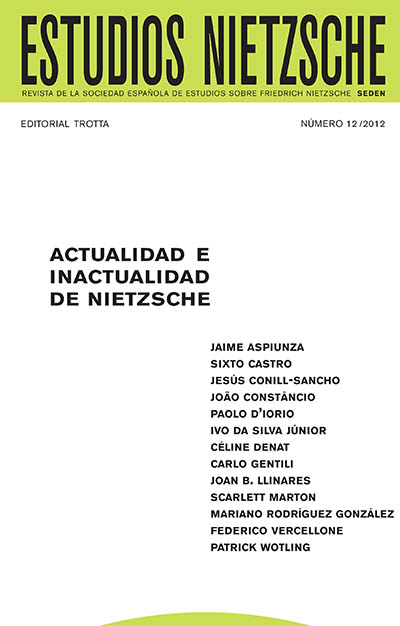«Posthumous Born», Distance and Otherness: The «Legibility» of the Nietzschean Text
DOI:
https://doi.org/10.24310/EstudiosNIETen.vi12.10557Keywords:
posthumous, distance, understanding, authorityAbstract
The term «posthumous», which was frequently used by Nietzsche in his writings, has been attributed as a quality to his work, because its unprecedented nature prevented his contemporaries from understanding it. This paper discusses in detail the term specifying, first, that, as only men are posthumous, only they can have a posthumous birth; second, trying to clarify why Nietzsche did not expect anything of their current readers because of the distance he took in his writings, for the reason that he sought being misunderstood. Thus, we will show that, when Nietzsche referred to his posthumous birth, he alluded to the future or outdate dimension of his thought.
Downloads
Metrics
References
Nietzsche, F., Obras Completas, I-IV (OC ). Director ed. Diego Sánchez Meca. Madrid: Tecnos, 2011-2016
Nietzsche, F., Correspondencia I-VI. (CO). Director ed. Luis E. de Santiago Guervós. Madrid : Trotta, 2005- 2012.
Nietzsche, F., Fragmentos Póstumos I-IV (FP). Director ed. Diego Sánchez Meca. Madrid: Tecnos, 2006-2010
Nietzsche, F, Crépuscule des idoles, «Introduction» trad. de P Wotling, Paris: Garnier-Flammarion, 2005
Downloads
Published
How to Cite
Issue
Section
License
As of issue 21 (2021) this journal is published only in open access (diamond route).
From that number 21, like the previous numbers published in NIETZSCHE STUDIES, they are subject to the Creative Commons Acknowledgment-NoComercia-ShareIgual 4.0 license, the full text of which can be consulted at <http://creativecommons.org/licenses/by-nc-sa/4.0 >
It is the responsibility of the authors to obtain the necessary permissions of the images that are subject to copyright.
This work is licensed under a Creative Commons Attribution-NonCommercial-ShareAlike 4.0 International License.
Copyright generates two different rights: moral rights and patrimonial rights that EJFB recognizes and respects. Moral rights are those relating to the recognition of the authorship. They are rights of a personal nature that are perpetual, inalienable, unseizable and imprescriptible as consequence of the indivisible union of the author and his/her work.
Patrimonial rights are those that can be derived from the reproduction, distribution, adaptation or communication of the work, among others.







11.png)
